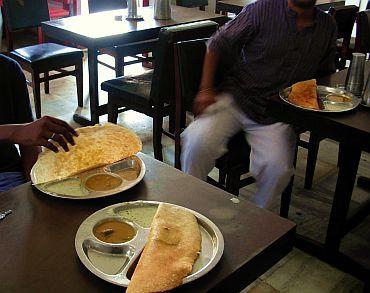
Chirag recently visited an upmarket restaurant in a mall in Delhi with his friends. They had a hearty meal and a jolly time but they were in for a rude shock when the invoice arrived.
The invoice seems to be never ending -- on top of the basic food items, they had added hazaar more line items and the bill seemed to be really inflated.
Has this happened to you also?
Have you ever faced terms such as 'service tax', 'VAT' and 'service charge' while eating out at a restaurant. However, instead of asking the restaurant authorities about these terms and their application, have you simply paid up to avoid any potentially embarrassing social encounter?
Fear not, after reading this article, you won't face any such problems again.
This is how a typical restaurant invoive looks like:
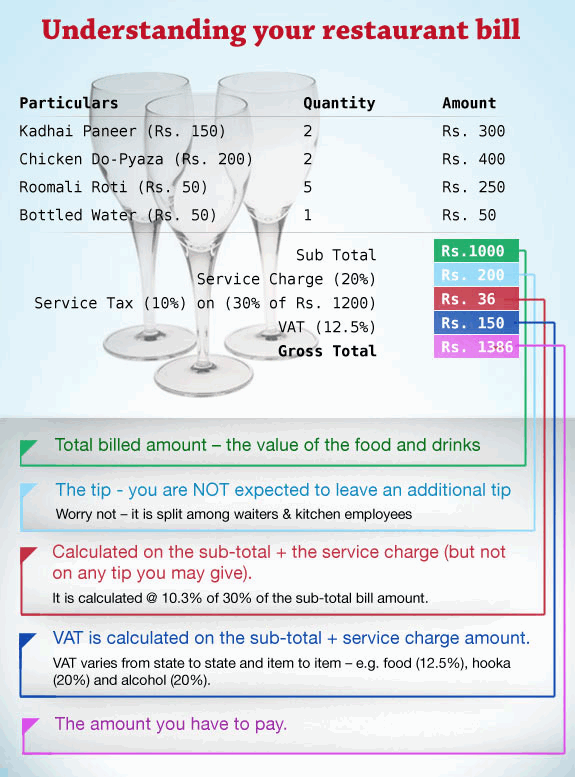
Courtesy: 
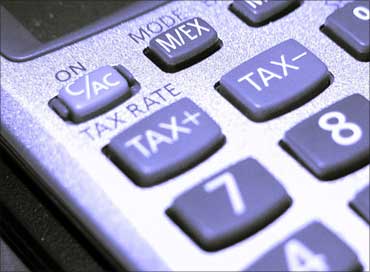
1. VAT
VAT is a value added tax which is imposed separately by each state. In the restaurant business the VAT rate has mostly been fixed at 12.5 per cent. Most states have a separate VAT Act and VAT Rules which govern the functioning of this tax. This seems simple enough but a combination of VAT with service tax will confuse you as to their application and approach.
2. Service tax
Restaurants, until May 2011, did not come under the purview of a 'taxable service' under Section 65(105) of the Service Tax Act. However, restaurants meeting both the following two criteria, will be required to pay service tax @ approximately 10.03 per cent:
1. Air conditioning AND 2. a liquor licence
If either of these criteria are not met, a restaurant cannot charge service tax. Of course, the restaurant passes on the service tax burden to the customers.
However, the finance ministry also realises that this service tax cannot be charged on the whole amount of the cheque. Since the tax being imposed is a service tax it is to be imposed only on the service component of the amount.
Thus, for this purpose the finance ministry has declared that the service tax is to be charged on 30 per cent of the invoice amount (excluding the VAT charges).
Therefore, the effective service tax becomes 3.09 per cent of your invoice.
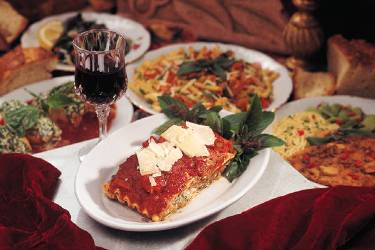
3. 'Service Charge' aka forced tip
Now, let us proceed to the more dubious question of 'service charges'. These charges work like a mandatory tip. Restaurants normally apply these to ensure that their working staffs have enough incentive (or just to extract more from you).
This practice is rather prevalent in the mid-range & high-range restaurants in and around the Delhi-NCR region (probably the disease has spread to all metros).
Is this legal? Can I refuse to pay service charge?
Before we answer this, remember, if there is service charge on the bill, there is absolutely NO obligation to pay a tip. This practice has apparently been borrowed from the West.
The legal position regarding the validity of this practice is not clear. However, one viewpoint is that it is illegal.
Legally, if eating at a restaurant is understood in contractual terms, the terms and conditions are present in the menu card, and most restaurants clearly mention the imposition of an extra service charge in its menu card. So, they can technically argue that you agreed to pay for it.
However, if there is no such mention of a service charge in the menu or in the restaurant, you can legally refuse to pay that amount. Service charge, unlike the VAT or Service Tax, is not your duty to the government, but a restaurant policy. However, if the imposition of service charge is clearly communicated by the restaurant, via its menu or otherwise, then the restaurants are entitled to include this amount when calculating your sub-total for service tax purposes.
If you received terrible service, it is always a good idea to try to get it removed. Some restaurants will oblige, some won't. But worth trying.
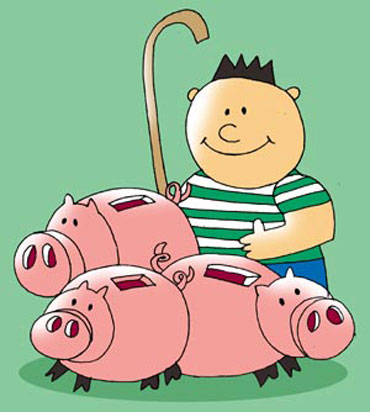
Some more legal/technical stuff
As is evident from the above illustration, the service tax can be imposed on the sum total of your subtotal and the service charge. Additionally, the VAT can also be charged on the sum total of your subtotal and the service charge (but not the service tax).
However, this imposition of VAT will depend on the definition of 'sale price' as given in the concerned state's VAT Act. For instance, the Delhi VAT Act definition of 'Sale Price' includes 'any sum charged for anything done by the dealer in respect of goods at the time of, or before, the delivery thereof'. Hence restaurants in Delhi can impose VAT on the service charge too.
However, this may differ for other states and union territories depending on their respective VAT Act.
For the really finicky readers, yes, this amounts to double taxation -- government is treating 30 per cent as both a goods and a service. Why? We don't know. But we checked -- yes this is double taxation. If a distinction is being drawn to distinguish between goods and services for the imposition of service tax and the service tax is thus being imposed on a part of the sub-total, shouldn't the VAT be imposed solely on the other part?
At present on a part of the sub-total there is a double incidence of tax (VAT & Service Tax) which is increasingly making it more expensive for the consumers to eat out at a reasonable price. Moreover, with some legislations allowing for VAT to be imposed on the service charges too, it will not become less expensive anytime soon.
Thanks to Neeraj Lalwani, NLU Orissa student and Akosha intern, who helped with the research and writing of this article.